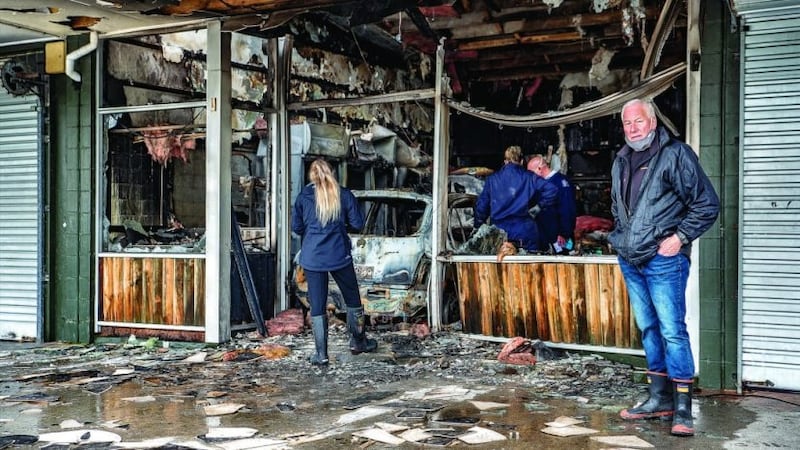Former Kawerau mayor Malcolm Campbell stands in front of his store, Campbell's Butchery, after a ram raid caused it to be gutted by fire in October last year. Photo / LDR / Troy Baker
Malcolm Campbell says military-style interventions with youth offenders did work, but did not go far enough - they needed to be followed up with pastoral care.
During his 21 years as mayor, Campbell had been involved with Social Sector Trials to improve social service delivery in Kawerau, the Mayors Taskforce For Jobs and has had close involvement with the Limited Service Volunteer programme, run by the New Zealand Defence Force.
Last October, he lost his more than six decades old family butchery business to a ram raid.
He strongly disagreed with those who said that boot camps for young offenders did not work in the past.
"It was not a failure for Kawerau. It was one of the best things that ever happened. The only part of it that did not work was that six weeks was not long enough. You have to do that wrap around support. You have to keep at them until they get up and they are on their way."
"Every one of them came out of there a changed person.
"I had a lot to do with those kids and it was, particularly the girls who really excelled, exponentially. Some of these kids are real tough nuts. They've had nothing all their lives but abuse and criticism. Whether you like it or not, they need a bit of tough love. The good part about it, in the army, it's a safer environment than the youth justice system.
"The problem was - and all governments have been guilty of this - when they finished, they were basically sent straight back to where they came from. No wrap around, no help, and they were just tossed on the heap again. That's where the whole thing failed."
He said that what made the difference in Kawerau was the pastoral care. Current mayor Faylene Tunui had been the person responsible for that pastoral care during the Social Sector Trials, making sure the young people turned up to jobs that had been secured for them.
"I know of situations where she and her husband, Victor, would hop in the car at midnight to head down to Waharoa because some young guy was upset about his girlfriend back here and not showing up to work."
The National Party launched its policy on youth crime last week, which included the creation of youth offender military academies, to combat the increase in high-profile crimes such as smash and grabs and ram raids.
The Labour Party have dismissed the policy as one that has already been tried and failed, pointing to a similar policy run by John Key's government between 2010 and 2016.
Just the week before, Justice Minister Kiri Allan had addressed Kawerau Grey Power, likening boot camp-type facilities as "universities for young folk to become criminals".
"It sounds great ... chuck 'em in some kind of boot camp programme, but what have we got when they come out? Really fit young criminals with nationwide networks."
She also spoke about how she had "broke down a few times for our mate Malcolm", over the destruction of his butcher's shop due to a ram raid.
Campbell said he had moved past the events of October 2021 that saw his butchery, which was established by his family in the 1950s, gutted by fire.
"I'm over that now. Don't get me wrong, if I ever catch the person who done it, don't worry, they'll go to boot camp alright, but that's another story."
He said pastoral services that wrapped around the youths after they returned to society were an essential part of any programme and if National wanted it to work they would need to put the money where their mouths were.
"It has to be an investment. If you put them in jail with all the rest of the people in there they'll come out as career criminals. But don't just talk words to get votes. Put in the money and make it work properly."


